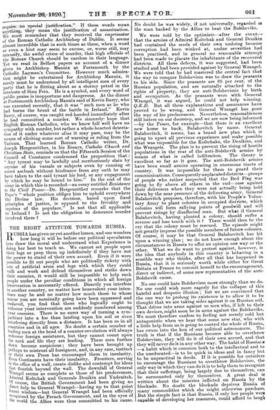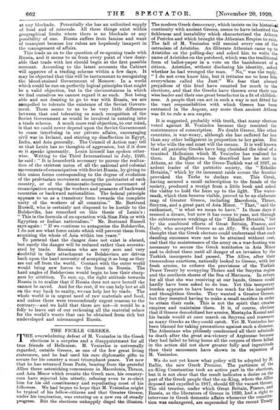• THE RIGHT ATTITUDE TOWARDS RUSSIA. R USSIA has given us
yet another lesson, and one wonders how long it will be before our political speculators here draw the moral and understand what Experience is doing her best to teach us. We cannot set people upon their legs or prop them up indefinitely if they have not the power to stand of their own accord. Even if it were possible to fit out people who are politically rickety with sets of artificial arms and legs with which they could walk and work and defend themselves and strike down their enemies, it would still be impossible to help such people under the peculiar conditions in which all foreign intervention is necessarily offered. Directly you interfere in another country, no matter how benevolent your inten- tions may be and no matter how much those to whose rescue you are nominally going have been oppressed and enslaved, you find that those who logically ought to welcome your intervention are suddenly numbered among your enemies. There is no surer way of turning a sym- pathizer into a foe than landing upon his soil or even interfering directly from a distance. It has been so in all countries and in all ages. No doubt a certain number of leading men at the head of a counter-revolution will always welcome foreign assistance, but they cannot count upon the rank and file they are leading. These men further down become suspicions; they have been brought up Perhaps to mistrust all foreigners, and, in any case, instinct i or their own Press has encouraged them n insularity. Even Continents have their insularity. Frontiers, serving in the office of a wall, create dislike and contempt for ideas that flourish beyond the wall. The downfall of General Wrangel seems as complete as those of his predecessors, Admiral Koltchak and Generals Denikin and Yudenitch. Of course, the British Government had been giving no rect help to General Wrangel—having up to that point rnt wisdom—but General Wrangel had been officially ree°gnized by the French Government, and in the eyes of the world the Allies were thus committed to his cause. No doubt he was widely, -if not universally, re_ garded the man backed by the Allies to beat the Bolsheviks.
Wewere told by the optimists—after the event-- that the armies of Admiral Koltchak and General Denikis had contained the seeds of their own undoing because corruption had been winked at, undue severities had been practised, and in general no reasonable attempt had been made to placate the inhabitants of the recovered districts. All these defects, it was suggested, had been studied and had been provided against by General Wrangel. We were told that he had mastered the central fact that the way to conquer Bolshevism was to draw the peasants to his side. Since the peasants are 85 per cent. of the- Russian population, and are naturally attached to the rights of property, they are anti-Bolshevistic by birth and occupation. As the peasants were with General Wrangel, it was argued, he could not help winning. Q.E.D. But all these explanations and assurances have proved to be wrong, and General Wrangel has goner the way of his predecessors. Nevertheless, reasonableness still loiters on our doorstep, and we are now being informed —by the Times, for example—that there is an excellent new horse to back, Balahovitch by name. General Balahovitch, it seems, has a brand new plan which is going to upset all previous experience and make possible what was impossible for the Koltchaks, the Denikins, and the Wrangels. The plan is to prevent the rising of hostile. populations in the rear of the anti-Bolshevik armies by means of what is called infiltration. The theory is excellent so far as it goes. The anti-Bolshevik armies have been small armies operating in enormous tracts of country. It was impossible for them to guard their communications. Consequently unplacated districts—groups of people who rather suspected that the Red Flag was going to fly above all others in the end—rose against their deliverers when they were not actually being held down by the near presence of the delivering army. General Balahovitch proposes, therefore, with his People's Volun- tary Army to plant colonies in occupied districts, which colonies will form rallying points of goodwill and will prevent risings by disaffected men. But what if General Balahovitch, having planted a colony, should suffer a reverse and lose touch with it ? There would then be the cry that the colony must be rescued. The episode might not greatly impress the possible members of future colonies. Of course, it may be that General Balahovitch has hit upon a winning plan ; we do not know enough about the circumstances in Russia to offer an opinion one way or the other. What we do want to protest against, however, is the idea that anybody in this country is behaving in a sensible way who thinks, after all that has happened in Russia, that it is seriously worth while either for Great Britain or France to commit herself to the encouragement, direct or indirect, of some new representative of the anti- Bolshevik cause.
No one could hate Bolshevism more strongly than we do. No one could wish more eagerly for the collapse of this hateful and despotic illusion ; but we are convinced that the one way to prolong its existence is to allow it to be thought that we are taking sides against it on Russian soil. That drives into arms against us men who, if left to their own devices, might soon be in arms against the Bolsheviks. We must therefore confess to feeling not merely cold but antagonistic when we hear that some new star, who with a little help from us is going to control the whole of Russia, has swum into the ken of our political astronomers. The truth is that if the Russians become able to overthrow Bolshevism, they will do it of their own accord, and that they will never do it in any other way. The habit of Russians —a habit which is common both to the intellectual and to the uneducated—is to be quick in ideas and in fancy but to be unpractical in deeds. If it is possible for outsiders to encourage the Russians to overthrow Bolshevism, the only way in which they can do it is to help them to recognize that their sufferings, being largely due to themselves, can be surmounted only by themselves. A great deal is written about the miseries inflicted on Russia by the blockade. No doubt the blockade deprives Russia of many commodities which she might otherwise purchase, But the simple fact is that Russia, if only her people were capable of developing her resources, could afford to laugh at any blockade. Potentially she has an unlimited supply of food and of minerals. All these things exist within geographical limits where there is no blockade or any possibility of one. Russia suffers from famine and want of transport because her rulers are hopelessly inexpert in the management of affairs. This leads us on to the question of re-opening trade with Russia, and it seems to us from every point of view desir- able that trade with her should begin at the first possible moment. According to the latest accounts the Cabinet will approve of a trading scheme within a few days. It may be objected that this will be tantamount to recognizing the blood-stained Government of Moscow. In a world which could be run on perfectly logical principles that might be a valid objection, but in the circumstances in which we find ourselves we cannot regard it as such. Not being able and not desiring to go to war with Russia, we are compelled to tolerate the existence of the Soviet Govern- ment. There seems to US to be very little difference between that and tolerating so much recognition of the Soviet Government as would be involved in entering into a trade scheme. A much more real objection, to our mind, is that we could -never depend upon the Soviet Government to cease interfering in our private affairs, encouraging civil WaT in Ireland, and stirring up disaffection in Egypt, India, and Asia generally. The Couacil of Action roay tell us that Lenin has no thoughts of aggression, but if it does so it speaks ignorantly. Lenin himself has spoken other- wise. Writing to the Third International in July, 1920, he said : " It is henceforth necessary to parsue the realiza- tion of the strictest union of all the national and colonial Movements of emancipation with Soviet Russia, by giving to this union forms corresponding to the degree of evolution of the proletarian movement among the proletariat of each country, or of the democratic-bourgeois movement of emancipation among the workers and peasants of backward countries or backward nationalities. The federal principle appears to us as a transitory form towards the complete- unity of the workers of all countrieti." Mr. Bertrand: Russell, who is certainly not disposed to be hostile to the Bolsheviks, has remarked on this thesis of Lenin's : "This isthe formula of co-operation with Sinn Fein or with Egyptian or Indian nationalism." Mr. Bertrand Russell says again : "If we continue to antagonise the Bolehevike, I. do not see what force exists which will prevent them from., acquiring the whole of Asia within ten years." To pretend that the danger does not exist is absurd,, but surely the danger will be reduced rather than aocentu- ated by trade. Russians who are very sore and very doubtful in their attachineut to Bolshevism are driven back upon the hard necessity of accepting it so long as they are cut off from the world. Contact with the outer world would bring new forces to the front in Russia. The hard angles of Bolshevism would begin to lose their sharp- ness by attrition. To sum up, the right attitude towards Russia is to realize that if Russia does not save herself she cannot be saved. And for the rest, if we can help her at all on the way back to sanity, we can help her by trade. The whole world is in urgent need of raw materials and food, and unless there were tremendously urgent reasons to the contrary—and we hold that there are not—it would be a , folly to leave out of our reckoning all the material solace for the world's wants that can be obtained from rich but undeveloped and mismanaged Russia,



































 Previous page
Previous page